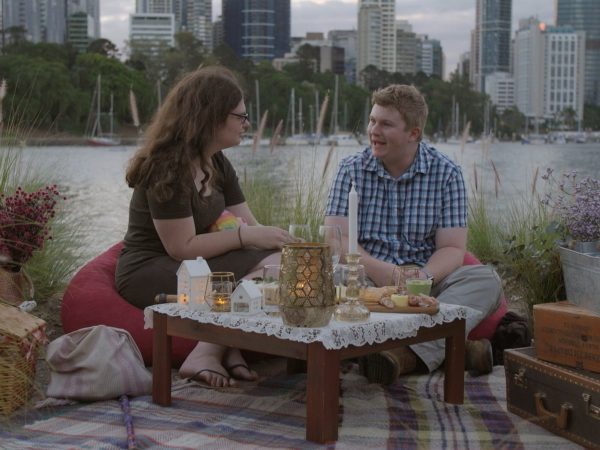Television Review: “Love on the Spectrum” — Celebrating Autism
By Sarah Osman
Love on the Spectrum is a trailblazing docuseries that dismantles myths about autism and romance.

Ruth and Thomas enjoy an outdoor date in Love on the Spectrum. Photograph: Netflix
According to the CDC, roughly one percent of the world’s population has autism and, in the United States, it is estimated that more than 3.5 million Americans lie somewhere along the autism spectrum. Despite its prevalence, media representations of those on the spectrum have been and remain rare. While Netflix’s Atypical centers on an autistic young man (and does so with grace), many shows do not. From Glee’s Sugar Motta, who was a hacky stereotype of those with autism, to Sheldon Cooper on The Big Bang Theory, autism is often misrepresented and misunderstood, even today, in our supposedly more enlightened times.
And this is why Netflix’s newest docuseries, Love on the Spectrum, represents such a welcome change. After airing in Australia last year, this five-part docudrama takes an honest look at what it’s like for people with autism to date. The series is hilarious at points because, let’s face it, romance is a complex and awkward ordeal — no matter who one is. Michael, a 25-year-old who has placed “love ducks” on his nightstand to bring him relationship good luck, is incredibly endearing. He is determined to be a great husband. He struggles a bit to comprehend what coupling is about in today’s society: he proclaims to his family that most people are only interested in “intercourse.” Michael’s family is amused by his blunt demeanor, yet there is also considerable poignance in his predicament as well. You also can’t help but root for a guy who has already carved a heart-shaped box as a gift for his future wife.
Another of the show’s triumphs is that it is LGBT inclusive, focusing on people with other disabilities. Chloe, a 19-year-old who is partially deaf, is openly bisexual, and has an adorable date that revolves picking sunflowers. Mark, who is a big fan of dinosaurs, first tries to go out with Maddie, but finds that they aren’t compatible. He then dates Lauren, who has cerebral palsy (and who loves penguins because they walk the way she does). The series includes segments in which each individual talks about their likes and dislikes, which reminds viewers that difference is negligible: these are people with the same feelings and desires as the rest of us.
Many dating shows, such as The Bachelor, often leave viewers feeling like icky voyeurs. That is not the case with Love on the Spectrum. Watching each person go out on a date, I found myself rooting for them, eager to see how things work out. When the date didn’t go well, I felt bad. But it was impossible not to to be inspired by the subjects’ positivity, their determination to just get back out there and keep trying.
Romance is its primary focus, but Love on the Spectrum celebrates all kinds of love. The moms and dads here are incredibly kind and supportive (as well as nosy about their children’s dating lives, as most parents are). Many families and friends attend community nights, speed dating events, and dating workshops. It is endearing to watch those searching for love interact with their best friends, as well as dealing with their dates.
Two experts who run various workshops for those with autism are featured on the show. They make sure that viewers know that those on the spectrum are as eager to date as anyone else, which contradicts a dangerous myth about autism and isolation. In addition to featuring those who are single, the series also includes two couples who are madly in love (one couple becomes engaged, the other moves in together). Seeing autistic couples also undercuts the fiction that those on the spectrum cannot find, and maintain, a loving relationship. Also, we see the show’s subjects stick to their deal breakers; for example, Mark refuses to date a girl who hates dinosaurs, which is indeed a wise decision. We see that autistic individuals have the strength (and should be given the power) to help decide what is good for them. These are people who have embraced who they are and what they are looking for in a mate. They aren’t going to lower their standards.
Love on the Spectrum is a one-of-kind series, a program that celebrates autism. Each individual is slightly different, but that serves as an invaluable reminder that we are all unique — and that’s what makes us beautiful. In that sense, the docuseries is about us all — about the love we all struggle to give and receive in a challenging world.
Sarah Mina Osman is a writer living in Los Angeles. She has written for Young Hollywood and High Voltage Magazine. She will be featured in the upcoming anthology Fury: Women’s Lived Experiences under the Trump Era.
